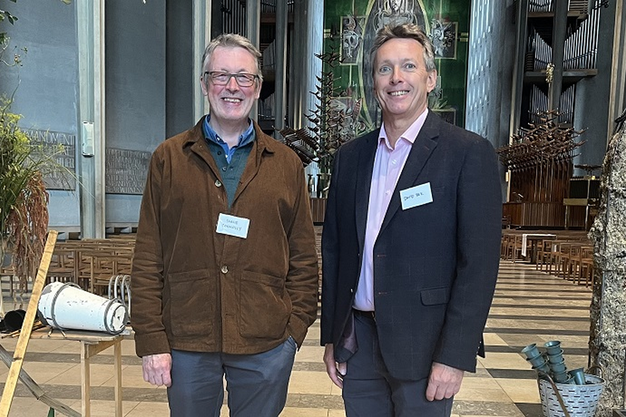Coventry University is leading a project to reduce plastic, packaging, and waste in the British cut-flower industry. "The cut-flower sector is a significant user of packaging, with multiple layers of plastic and other materials used to protect and hydrate flowers from grower to consumer."
Led by Professor David Bek, from Coventry University's Research Centre for Creative Economies, an industry working group has produced a new booklet and other resources designed to guide the floriculture industry towards more sustainable practices.
The working group, which is co-led by the University of Surrey, comprises collaborators such as the Floriculture Sustainability Initiative (FSI), Interflora, the British Floristry Association, Flowers from the Farm, JZ Flowers and Superflora, and Bloom and Wild.
An official launch event was held at Coventry Cathedral, which showcased demonstrations of sustainable floristry design, including that of The King's florist, Shane Connolly.
 Professor David Bek and Shane Connolly in Coventry Cathedral
Professor David Bek and Shane Connolly in Coventry Cathedral
Partly funded by an Impact Acceleration Account (IAA) awarded to Coventry University by the Economic and Social Research Council, the project aims to transform the industry by encouraging and promoting sustainable practices by offering practical guidelines for reducing environmental impacts, such as minimizing the use of single-use plastics and improving packaging efficiency.
"While important for product protection, the widespread use of single-use plastics poses a significant environmental concern. As consumer demand for sustainable practices grows, businesses that adopt eco-friendly methods enhance environmental sustainability, improve efficiency and lower costs".
Shane Connolly: "I have struggled for years with the idea that so many florists feel that nature is their inspiration and guide, yet so much of floral practice is damaging to nature.
It has been wonderful to see this dichotomy addressed at the event in Coventry Cathedral. We need to offer solutions to florists rather than bombard them with the issues and that's what we're starting to do.
For many years I have tried to promote more sustainable practice in the floral industry, so it was an honour to be part of this event where the solutions are being presented along with the issues, and in a way that is supported by robust academic research."
Professor David Bek said: "The strength of this project lies in the commitment offered by industry and expert stakeholders. Their support not only lends credibility to our initiative but also amplifies the sustainability message within the industry. This project represents a crucial step toward reducing the environmental impact of the cut-flower industry and the involvement of respected industry leaders is a testament to its importance."
Professor Jill Timms: "For me, at the core of this project and our working group is collaboration. It has been challenging, but we have brought people together from across flower supply chains - both global and local. We have produced guidance which has been really useful to many different groups and sets a high bar for the ambitions we have to bring about significant policy and behavioural change for a more sustainable, and less wasteful and plastic orientated flower industry future."
For more information:
Coventry University
coventry.ac.uk
